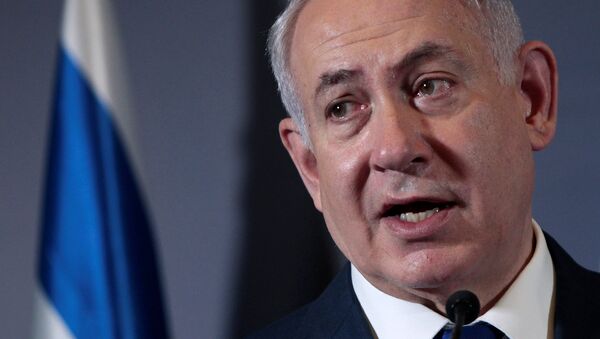"After decades, I have the honor to be the first Prime Minister to build a settlement in Judea and Samaria [the occupied West Bank's Biblical name] — there was not and will never be as good a government for the settlements as ours," Netanyahu bragged.
The construction marks the first entirely new settlement in the occupied territories of the West Bank and East Jerusalem since 1992, and is intended to house residents of the West Bank outpost of Amona, demolished by the Israeli military in February.
היום החלו העבודות בשטח, כפי שהבטחתי, להקמת היישוב החדש למתיישבי עמונה. אחרי עשרות שנים, יש לי הזכות להיות רה״מ שבונה יישוב חדש ביו״ש pic.twitter.com/sNDKlDzaCu
— Benjamin Netanyahu (@netanyahu) June 20, 2017
The settlements in Amona were built on private Palestinian land, and the Israeli High Court ruled them illegal — Netanyahu's government faced losing a sizeable Jewish population in the occupied territories, and rather than readmit affected individuals to Israel, the administration opted to construct an entirely new living space.
The plan to construct the settlement in Emek Shilo — close to the city of Ramallah — was widely condemned, with UN Secretary-General Antonio Guterres expressing "disappointment and alarm" at the prospect.

Israeli NGO Peace Now said the proposed development was "strategic for the fragmentation of the West Bank," as it would create an unbroken array of settlements stretching from the Green Line to the Jordan Valley, in turn "[undermining] the possibility of creating a viable Palestinian state."
The move is particularly shocking given the "Oslo Accords" — inked in 1993 by then-Israel premier Yitzhak Rabin and Palestine Liberation Organization Chair Yasser Arafat — put an effective halt on the building of new settlements. The government of Israel has often pointed to its adherence to this injunction as a demonstration of dedication to achieving an equitable peace with Palestine.
The new endeavor makes a mockery of such claims — and in any event, ever since the Accords' signing, expansion of existing settlements has continued apace. At the time, roughly 200,000 Israeli settlers illegally resided in the region — as of June 2017, that figure has leaped to over 700,000.
Moreover, in the year between March 2016 and April 2017, the Israeli Central Bureau of reported a stark increase in construction efforts in the settlements, with new building initiatives increasing 70 percent year-on-year — in all, construction began on 2,758 housing units compared to 1,619 the calendar year prior. Conversely, the data shows during the same period, there was a decrease of 2.65 percent in new home construction projects within the state of Israel proper.
"Instead of working to solve the Israeli housing crisis, the government prioritizes a radical minority living beyond the boundaries of the state. The highest price to be paid for the sharp increase in construction starts beyond the Green Line is a political price, as such construction continues to distance us from the only way to end the Israeli/Palestinian conflict — a two state solution," Peace Now said in a statement.
The settlements' origins date back to the 1967 Six-Day War, in which Israel captured the West Bank. Prior, no Israeli citizens had lived in the territory for around two decades. In 1968, small groups of Israeli Jews began settling the territory, citing its proximity to the Tomb of the Patriarchs, one of the holiest sites in Judaism. The UN has repeatedly called the settlements illegal, and called for their end.
Nonetheless, Israel maintains the city of Jerusalem is its "eternal and indivisible" capital — a claim no country officially recognizes as of 2017, although US Ambassador to the United Nations Nikki Haley has said it is "a matter of time" before the American embassy is moved there from Tel Aviv.
Such a move would be problematic for two-state solution advocates, who view the eastern part of the city as Palestine's future capital — and while Israel tends to speak of East Jerusalem and the West Bank as two separate entities, the Palestinians regard them as a single, occupied entity.
One oft-mooted solution to the quandary are "land swaps" — the largest Jewish settlements, near the boundary with Israel, would formally become Israeli territory, and Israel would turn over an equal amount of its land to Palestinians in exchange. In addition, settlements deep in the West Bank would be disbanded. Given the latest developments in the ongoing saga, such an eventuality seems less likely than ever.





